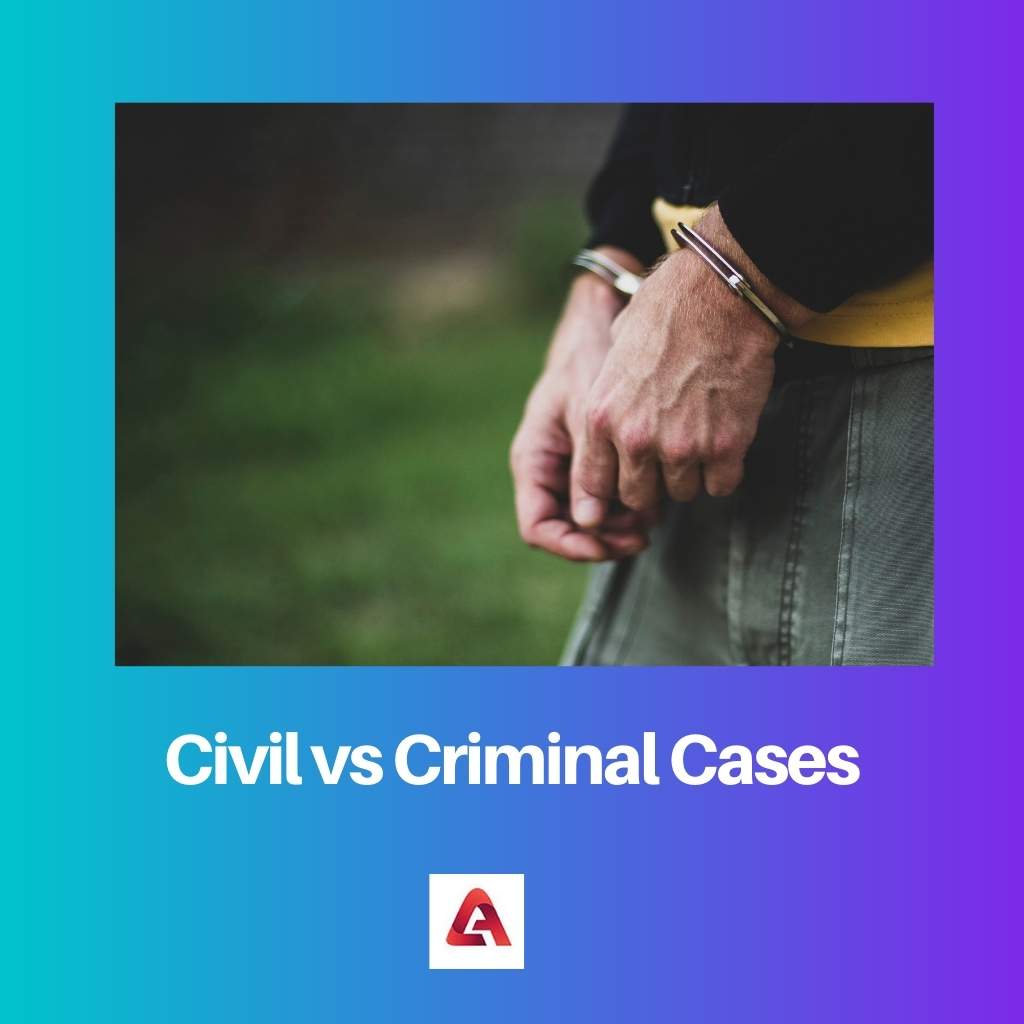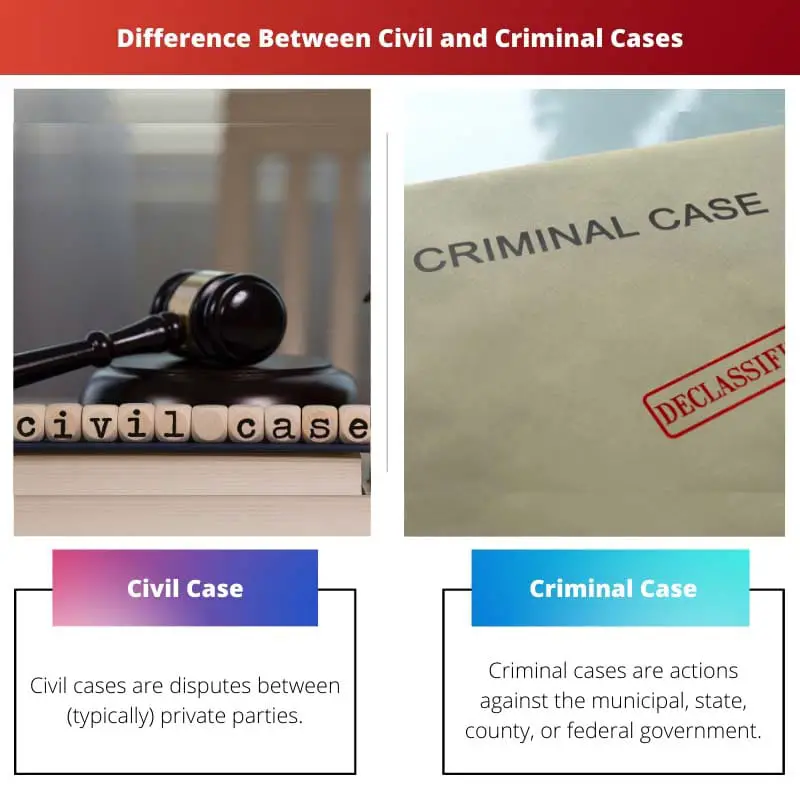Civil lawsuits are involving private conflicts between individuals or groups of people. When it comes to creating our justice system, two distinct bodies of law are involved: civil cases and criminal cases.
Civil and criminal trials both look into the breaches of people’s rights and determine who is to blame. They vary, however, in terms of their organization, requirements of evidence, and punishments.
Key Takeaways
- Civil cases deal with disputes between private individuals, while criminal cases involve offenses against the state or society.
- In civil cases, plaintiffs seek compensation or other remedies, whereas criminal cases aim to punish offenders.
- Criminal cases require a higher standard of proof, “beyond a reasonable doubt,” while civil cases use “a preponderance of the evidence.”
Civil vs Criminal Cases
Civil law deals with acts related to individuals to which harm caused can be repaid by compensation or monetary relief, while Criminal law deals with crimes that cause damage to a person that’s an offence against society as well. Relief given against crime is charging the accused with imprisonment.

To file a civil lawsuit in the Federal Court, the plaintiff filed a complaint with the court and served a copy of the complaint on the defendant.
The plaintiff’s losses or injuries are detailed in the complaint, which also describes how the defendant caused the damage, establishes the court’s jurisdiction, and asks for a remedy.
A crime, according to criminal law, is an act against society rather than an act against an individual. As a result, the government takes legal action against someone who has committed a crime.
If the defendant is found guilty, he or she may be sentenced to pay a fine, spend time in jail or prison, or be put on probation.
In the eyes of the law and society, imprisonment, or the loss of one’s personal freedom, is a more serious punishment than a monetary fine.
Comparison Table
| Parameters of Comparison | Civil Cases | Criminal Cases |
|---|---|---|
| Definition | Civil cases are disputes between (typically) private parties. | Criminal cases are actions against the municipal, state, county, or federal government. |
| Standard of Proof | A preponderance of the evidence. | Beyond a reasonable doubt. |
| Burden of Proof | Rest with the plaintiff. | Rest with the government, |
| Decision | Liable or not liable. | Guilty or not guilty. |
| Example | Personal Injury. | Murder, Burglary. |
What are Civil Cases?
A civil lawsuit starts when a person or organization (such as a business or the government), referred to as the plaintiff, alleges that another person or entity (referred to as the defendant) has failed to fulfil a legal obligation due to the plaintiff.
The plaintiff and defendant are both referred to as “parties” or “litigants,” and the plaintiff may petition the court to order the defendant to fulfil his or her obligations or to compensate the plaintiff for the damage he or she has caused.
Respecting rights established by the constitution or federal or state legislation is one of the legal obligations. Both state and federal courts may hear civil cases.
A citizen (including a business) suing another citizen for breaching a contract is an example of a civil lawsuit in a state court. Individuals, businesses,
and the federal government may all file civil lawsuits in federal court alleging that federal legislation or constitutional rights have been violated.
For example, the federal government may sue a hospital for violating federal law by overbilling Medicare and Medicaid.
A person may sue a municipal police agency for violating their constitutional rights, such as the freedom to freely assemble.

What are Criminal Cases?
A person suspected of a crime is charged in a formal allegation known as an indictment (for felonies or severe offences) or information (for less serious crimes) (for misdemeanours).
If the person is charged with a federal offence, the government prosecutes the case on behalf of the American people via the United States Attorney’s Office.
State crimes are prosecuted by a state’s attorney’s office (sometimes known as a “District Attorney”).
It is not the duty of the victim to file a criminal complaint. In an abduction case, for example, the government would prosecute the kidnapper while the victim remained uninvolved.
There may not be a victim in certain criminal instances. For example, the state government will arrest and punish people suspected of violating drunk driving laws because society considers this a serious crime that may harm others.
When a court finds that a person has committed a crime, he or she will be sentenced.
If it’s a federal felony, the punishment may include a monetary penalty (a fine and/or restitution to the victim), incarceration, and community supervision (by a court employee known as a combination of these three options.

Main Differences Between Civil and Criminal Cases
- Conflicts between (usually) private parties are known as civil suits, whereas criminal cases are lawsuits brought against the local, state, county, or federal governments.
- In criminal proceedings, the prosecution must persuade the jury that the defendant is guilty “beyond a reasonable doubt,” while in civil matters, a “preponderance of the evidence” is required.
- Civil Cases’ burden of proof is with the plaintiff. In the case of Criminal Cases, the burden of proof is with the government.
- Civil Case’s decision is Liable or not liable case of Criminal Cases decision is Guilty or not guilty.
- Civil Cases, example is Personal Injury case of Criminal Cases, example is Murder, Burglary

- https://heinonline.org/hol-cgi-bin/get_pdf.cgi?handle=hein.journals/glj94§ion=9
- https://heinonline.org/hol-cgi-bin/get_pdf.cgi?handle=hein.journals/mnlr60§ion=24

The article effectively explains the purpose and process of filing a civil lawsuit, as well as the responsibilities of the government in criminal cases. This comparison between civil and criminal lawsuits is highly educational.
Indeed, the comprehensive overview of civil and criminal cases provides a clear understanding of their fundamental differences and implications.
I couldn’t agree more, Jmorris. The article offers valuable insights into the distinctions between the legal procedures of civil and criminal cases.
The article is an enlightening discourse on the legal nuances of civil and criminal cases, offering valuable insights into their distinctive legal nature.
I agree. The article’s detailed comparison of the legal requirements in civil and criminal cases enriches the comprehension of these legal mechanisms.
Absolutely, Yvonne. The comprehensive overview of civil and criminal laws provides a profound understanding of their respective legal implications.
The article clearly outlines the process of civil lawsuits and the distinctive nature of criminal cases. It’s an insightful read for anyone seeking to understand the legal system better.
I completely agree. The detailed explanation of the legal procedures in each case helps in comprehending the complex nature of the justice system.
Absolutely, William. The article’s approach to dissecting civil and criminal cases is both enlightening and educative, providing crucial information to readers.
The article provides a comprehensive comparison between civil and criminal cases, covering various aspects such as standard of proof, burden of proof, and examples of each case. This thorough analysis is greatly appreciated.
I couldn’t agree more, Richardson. The clear and detailed information makes it easier to understand and differentiate the two types of cases.
The article meticulously examines the differences between civil and criminal law, focusing on legal obligations and the decision-making process. It’s a valuable resource for anyone interested in studying the legal system.
Absolutely, Baker. The article’s in-depth exploration of civil and criminal law provides a comprehensive understanding of their impacts on the justice system.
I completely agree. The articulation of the legal procedures and implications for both types of cases is highly informative and enlightening.
The article is highly informative, offering a clear comparison between civil and criminal cases. It effectively illustrates the legal procedures and standards of proof for each type of case.
I couldn’t agree more, Maria. The article’s detailed analysis of civil and criminal lawsuits enhances the understanding of their distinct legal requirements.
The article does a great job of explaining the legal obligations involved in civil lawsuits and criminal cases. The examples provided effectively illustrate the various scenarios for both types of cases.
I completely agree, Laura. The article’s emphasis on practical examples enhances the clarity and comprehension of civil and criminal law.
The article presents a comprehensive understanding of the legal framework, exploring civil cases and criminal lawsuits in detail. It offers valuable insights into their individual characteristics.
Indeed, Carmen. The article delves deep into the intricacies of civil and criminal law, providing a profound explanation of their fundamental differences.
This article explains very well the difference between civil and criminal lawsuits, the burden of proof and the overall process for each case. It is interesting to learn more about this topic.
Absolutely, the details provided in the article are very informative and help clarify any doubts about the topic.
I totally agree with you, Ellie. It’s essential to understand these differences to improve our knowledge about the law.
The article brings up an important distinction between civil and criminal law, highlighting the obligations of both the plaintiff and the government in each case. The comparison table is particularly helpful for summarizing the differences.
I found the detailed breakdown of civil and criminal cases very enlightening. The article effectively explains the decision process and examples of each type of case.
I share your sentiment, Nikki. The examples provided indeed make it easier for readers to grasp the key differences between civil and criminal cases.